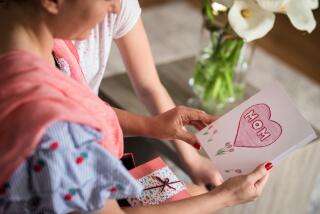‘Mother’s Day Cards’ Highlight Plight of Older Women
- Share via
The arrival of Mother’s Day invariably triggers pangs of guilt for those neglectful offspring who forgot to send a card. Usually, they are able to assuage their consciences by picking up the phone or wiring their moms a box of candy or some flowers.
However, a national older women’s group is not letting lawmakers off the hook that easy.
The Older Women’s League is sending Mother’s Day cards to more than 2,000 federal and state legislators nationwide, chastising them for cutting programs and services on which older women depend.
“Your mother didn’t raise you up to let other mothers down,” the cards say. They challenge congressmen to explain to their own mothers their positions on proposed spending cuts in Social Security, Medicare and senior housing programs. “What do you suppose she’d say about your vote on these issues?”
“We want them to think beyond the traditional hearts and flowers,” said Doris Steinman, 64, president of the Older Women’s League’s San Diego chapter. “While they’re sweet and while they smell nice, they’re not very long-lasting. We say, ‘make a gift to your mother--a commitment to fight for legislation that will improve conditions for all mothers.’ ”
One of the most significant threats to the well-being of America’s mothers, says Steinman, is the Reagan Administration’s proposed freeze in cost-of-living adjustments for Social Security recipients.
“The President promised not to cut support for elderly women,” Steinman said. “With increases in the cost of living, a freeze (in Social Security increases) is a cut . . . . What for some people may not be harming their way of life or their life style could, for others, be a matter of eating or not eating.”
But while the group is hoping that the Mother’s Day cards may sway a few votes on legislation affecting older women, Steinman said the campaign is more than just a lobbying effort.
“It’s a way of focusing attention on the needs of older women around the country,” she said. “Unless people are really alerted to the numbers of people out there who are hurting, then nothing will change.”
Those numbers, Steinman said, reflect the severity of a problem that is often forgotten as easily as a card on Mother’s Day.
“One of the things we’re stressing is that 71% of the elderly poor are women,” she said. “Three-fourths of public housing is occupied by the older (population), and three-fourths of them are women. We have to remember that the voices of the older and poor are not heard unless there are others who speak out for them.”
More to Read
Get the L.A. Times Politics newsletter
Deeply reported insights into legislation, politics and policy from Sacramento, Washington and beyond. In your inbox twice per week.
You may occasionally receive promotional content from the Los Angeles Times.







